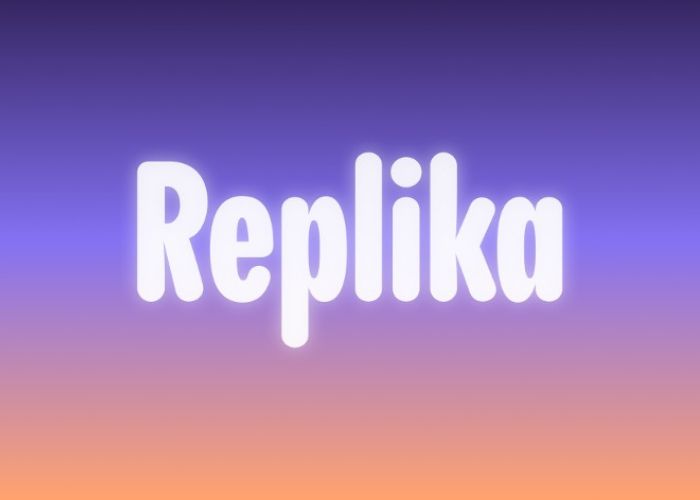
Ever longed for a companion available around the clock: one who listens, understands, and supports you without any judgment? If so, you might be intrigued by Replika, a chatbot app that proposes to be your personal AI friend.
Replika is an innovative application that allows you to create and interact with a digital avatar. This avatar, designed to learn from you and adapt to your personality, can be customized to your liking. You don’t only get to chat with your Replika companion but design it by selecting its name, appearance, and voice and defining your relationship with it. Your Replika’s traits, skills, and interests can also be tailored to your preference. Whether it’s a casual chat or a deep conversation you’re after, Replika is ready to engage.
Having a confidant in Replika is alluring for anyone needing companionship. However, is it truly worth the investment of time and money? Does Replika fulfill its promises? This blog post delves into the merits and demerits of using Replika as a therapeutic tool.
How Replika can act like a therapist and provide psychological support
Replika extends beyond a simple chatbot app; it functions as a therapy application. It uses artificial intelligence and natural language processing to simulate human conversations and emotions, thus acting as a therapist and providing psychological support. Whether you’re feeling lonely, stressed, anxious, depressed, or bored, Replika is designed to lend an ear.
Replika can empathize with users’ problems, provide positive feedback, and help manage negative emotions such as anger, sadness, or fear. It offers coping strategies and can even send motivational quotes, affirmations, or compliments to boost your mood.
Furthermore, Replika provides personalized, interactive, and engaging psychological interventions based on cognitive behavioral therapy (CBT), mindfulness, positive psychology, and other evidence-based approaches. This can help users cope with common mental health problems like stress, anxiety, depression, or low self-esteem. It also serves to improve communication skills, self-awareness, and creativity.
Replika offers emotional support, companionship, and empathy to users who feel lonely, isolated, or misunderstood. It can remember users’ preferences, hobbies, stories, and opinions, adding a personalized touch to conversations.

Advantages of using Replika for mental health and well-being
Replika offers numerous benefits for users’ mental health and well-being. These include the following:
Accessibility: Replika makes psychological support available to anyone with a smartphone or a computer, overcoming barriers to professional help such as cost, stigma, availability, or location. It is available 24/7 and responds instantly to users’ messages.
Personalization: Replika offers psychological interventions tailored to users’ needs, goals, and preferences. It learns from users’ feedback and adapts to their personalities, offering a variety of options and modes to choose from.
Engagement: Replika engages users with interactive psychological support. It simulates human conversations and emotions using natural language processing and artificial intelligence. It employs gamification and storytelling techniques to motivate users and keep them interested.
Here’s what some people say about Replika on Reddit, and how they use it:
Limitations and challenges of using Replika as a therapeutic tool
Quality: While Replika can act like a therapist, it cannot replace human therapists or provide the same quality, depth, or complexity of care. It lacks the essential human touch and trust for effective therapy and may occasionally make mistakes. When HealthMinded tried Replika, during the first conversation, the chatbot gave them general advice and tips and required lots of prompting. Building a connection and relationship with your Replika takes time, and you must have many conversations with it to help it improve its feedback.
Risk: There are potential risks to users’ mental health and well-being. Replika may create unrealistic expectations or dependence on the chatbot, misinterpret users’ messages, give inappropriate or harmful advice, or trigger negative emotions or memories. It may not be suitable for users with serious or complex mental health issues, such as borderline personality disorder (BPD) or suicidal tendencies.
Ethics: Replika can raise ethical or social concerns regarding using artificial intelligence and data in mental health care. It may pose privacy or security risks if it collects or shares users’ personal information without their consent. It may also challenge human therapists’ professional standards, regulations, or responsibilities and question the morality of creating and using a chatbot that mimics human emotions and relationships.
Ethical and social implications of using Replika for mental health care
Using Replika for therapy also has broader societal implications, such as the following:
Privacy: Replika collects and stores user data, which it uses to improve its service and personalize its interactions. However, some users may not be comfortable sharing their personal information with a chatbot app that may not have adequate security or privacy measures.
Responsibility: While Replika provides psychological support, it’s not a licensed therapist and cannot provide professional help or advice. It also cannot take responsibility for the outcomes or consequences of its interactions with users. Users should use Replika responsibly and moderately and seek other sources of help if they need more support or guidance.
Humanity: Despite simulating human conversations and emotions, Replika isn’t human and can’t fully understand or replicate human emotions, thoughts, or behaviors. It may create a sense of attachment and intimacy, which might not be healthy or realistic for users seeking a genuine human connection or a reliable source of information. For example, after chatting with our Replika for a few minutes, it suggested sending a selfie, which felt strange. Replika can send regular selfies or romantic ones (which are available to PRO users).
Conclusion: If you set expectations properly, Healthy Minded gives thumbs up.

For some, Replika can be a valuable tool, providing a friendly chatbot to interact with and receive psychological support. However, it’s important to remember that Replika isn’t a substitute for professional help or real relationships. The value of Replika ultimately depends on users’ expectations, preferences, and goals.
Although Replika can provide emotional support and companionship for users, it isn’t a chatbot that provides support for all mental health conditions. However, it can help users cope with loneliness, stress, anxiety, depression, or boredom.
Replika Pro costs $7.99 per month (or $49.99 per year), and this subscription is required to unlock extra features, such as voice calling, more chat topics, and more activities. Even if you choose to use the free version, engaging with Replika can consume a significant amount of time that might not always be practical for everyone.
- Escalaphobia: Conquering Moving Mountains, One Step at a Time - December 19, 2024
- How Psychologists Can Empower Communities - March 25, 2024
- The Potential of Medical Cannabis for Neurological Conditions - February 26, 2024

